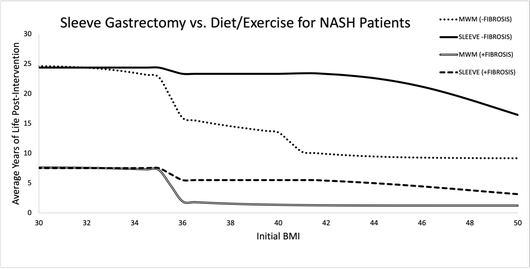Sleeve Gastrectomy Reduces Need for Liver Transplantation for NASH Patients
1Transplantation Surgery, University of Colorado Hospital, Aurora, CO, 2General Surgery, Hospital of the University of Pennsylvania, Philadelphia, PA, 3General Surgery, Thomas Jefferson University Hospital, Philadelphia, PA, 4Cardiothoracic Surgery, University of Colorado Hospital, Aurora, CO, 5General Surgery, Hospital of the University of Pennsylvania, Aurora, CO
Meeting: 2022 American Transplant Congress
Abstract number: 1463
Keywords: Hypercholesterolemia, Liver cirrhosis, Liver transplantation, Obesity
Topic: Clinical Science » Liver » 62 - Liver: Large Data and Artificial Intelligence
Session Information
Session Time: 7:00pm-8:00pm
 Presentation Time: 7:00pm-8:00pm
Presentation Time: 7:00pm-8:00pm
Location: Hynes Halls C & D
*Purpose: Non-Alcoholic Steatohepatitis (NASH) is one of the leading indications for liver transplantation (LT) in the United States. As with the current obesity epidemic, the incidence of NASH continues to rise. Medical weight management (MWM) can attenuate or even reverse NASH fibrosis. Additionally it has been suggested that bariatric surgery may potentiate a reduction in BMI for this population. However, the impact of broad utilization of bariatric surgery for NASH patients is unknown, particularly in regards to mitigating the need for LT.
*Methods: A decision analytic Markov state transition model was created to simulate the life of morbidly obese patients with NASH who were deemed ineligible to be waitlisted for liver transplantation unless they achieved a body mass index (BMI) less than 35 kg/m2. Life expectancy following MWM and sleeve gastrectomy (SG) were estimated. Base case patients were defined as having NASH (no fibrosis) and a pre-intervention BMI of 45 kg/m2. Sensitivity analysis of initial BMI was performed. Markov parameters were extracted from literature review.
*Results: SG improved survival and reduced need for liver transplantation compared to MWM. Base case patients who underwent SG gained 14.3 years of life compared to patients who underwent MWM. 1 year after weight loss intervention, 9% of MWM patients had required a liver transplant compared to only 5% of SG patients. Survival benefit for SG was observed above a BMI of 32.2 kg/m2.
*Conclusions: Surgical weight loss is associated with a reduction in the progression of NASH, thereby reducing the need for LT. A reduced BMI threshold of 32 kg/m2 for bariatric surgery may offer survival benefit for NASH patients.
To cite this abstract in AMA style:
Choudhury RA, Rouhi A, Hoeltzel G, Bababekov Y, Suarez-Pierre A, Yule A, Vigneshwar N, Williams N, Dumon K, Pomposelli J, Moore HB, Pomfret E, Nydam T. Sleeve Gastrectomy Reduces Need for Liver Transplantation for NASH Patients [abstract]. Am J Transplant. 2022; 22 (suppl 3). https://atcmeetingabstracts.com/abstract/sleeve-gastrectomy-reduces-need-for-liver-transplantation-for-nash-patients/. Accessed February 24, 2026.« Back to 2022 American Transplant Congress

